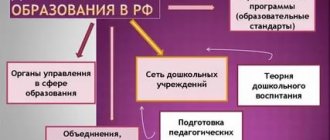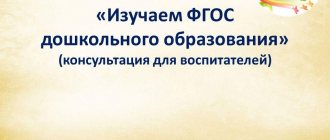Preschool education in Russia
Preschool education in Russia, namely the situation associated with preschool education in Russia can be called a crisis.
I believe that the main first problem is the universal availability of preschool education, which is currently not being implemented in this way. The growth in the number of places in preschool educational institutions is catastrophically behind the growth in the number of children. As we remember, the period of decline in the birth rate occurred in 1991 [1]. Then, many kindergarten buildings were transferred for long-term lease and at the full disposal of other departments or non-departmental organizations, which led to the fact that we now have to look for ways to provide places in preschool educational institutions for all needy preschool children. According to statistics, the reduction in the enrollment of children in the preschool education system in Russia was from 70% to 50%. This socio-economic situation forces us to pose new challenges to the preschool education system. Children entering school today have different starting opportunities, since almost half of them did not attend kindergarten and did not master educational programs. Most children enter first grade completely unprepared, so it can be difficult for them to take on a new position as a student. At school, different rules apply (relative to kindergarten), new demands are placed on the child, expectations arise - the child is not ready for all this. First of all, the children themselves, as well as their parents and teachers, “suffer” from this.
What does kindergarten give to the child himself? The main advantage of a preschool educational institution is the presence of a children's community, thanks to which a space of social experience for the child is created. Only in the conditions of a children's community does a child recognize himself in comparison with others, adopt methods of communication and interaction that are adequate to various situations, and overcome his inherent ego - Pavel Krusanov (“Dead Language”) [6, p. 23].
Preschool education in Russia is ensuring the intellectual, personal and physical development of a preschool child from 2 to 7 years old. The task of preschool education is to convey to the child the basic principles of culture and rules of behavior in society, as well as intellectual and aesthetic education.
Kindergarten is the first social institution that teaches children to live in society. It is in kindergarten that the child’s first independent contacts with the people around him take place; here he learns to communicate and interact. Communication with peers allows a child to quickly master new skills and acquire new knowledge, since the effect of imitation at an early age is very strong. Successful adaptation in a kindergarten or preschool education center is facilitated by educators whose goal is to help the child in any difficult situation.
For a long time, children who have not attended children's educational institutions often experience difficulties adapting to the school community. It is more difficult for them to start school than for kindergarten graduates, since they do not have sufficient communication skills. In addition, preschool education in kindergarten teaches the child strong-willed behavior and the ability to find compromises between his own desires and the desires of others. The child learns to protect his own interests without harming the interests of others. Also in kindergarten, children learn the basics of self-regulation. That is, the child learns to independently choose his own activity and devote a certain amount of time to the chosen activity. It is this skill that becomes the basis for a child’s organization at home and (in the future) at school. It is also extremely important that in kindergarten these qualities are formed naturally during the process of play, which is an integral part of the educational process. It is during games that the basic skills of independence, the ability to communicate and negotiate are formed.
Preschool education in kindergarten satisfies the child's needs for development and communication. Education at home, of course, can ensure that the child masters all self-service skills and acquires the knowledge necessary to prepare for school, but it is not able to teach the child how to live in a team. While it is the ability to find a common language with other people that is the key to a person’s success in adulthood.
Modern preschool education is focused on the development of the child’s personal qualities. Being in a group of peers allows the child to learn to communicate, defend his opinion and interests, and also take into account the interests and opinions of others. Children develop an idea of the social structure, because it is in kindergarten that the first role-playing games, for example, “daughters and mothers,” take place.
Preschool education in kindergarten allows the child to form his own idea of the world around him and his place in it. The child learns to evaluate his abilities and capabilities by comparing himself with his peers. That is, he develops an adequate self-perception. In addition to the communicative development of the child, the goals of preschool education include mental, moral, aesthetic and physical development. All these components are inseparable conditions for the formation of a full-fledged personality. Drawing, creating crafts and applications, designing, music and physical education classes - this is the minimum set that any kindergarten is ready to offer.
Currently, the preschool education system itself has changed. A differentiation of preschool educational institutions by types and categories has been introduced. To the previously existing only type - “kindergarten”, new ones were added - a kindergarten with priority implementation of the intellectual or artistic-aesthetic, or physical development of pupils, a kindergarten for children with disabilities in physical and mental development, supervision and health improvement, a kindergarten-development center child, etc. [5, p. 7] And there are also various additional clubs for preschool education. On the one hand, it is good that at least some conditions are created for preschoolers, and also allows parents to choose an educational institution that meets their needs, on the other hand, most of these types do not meet the laws of child development. And also the disadvantage of such additional institutions is that not every parent can support them financially, because such institutions charge more than in kindergartens. These additional institutions provide training for only 2–3 hours several times a week, and in kindergarten the child spends almost 12 hours. The specificity of education in a preschool institution is that, unlike additional education, it is carried out throughout the day and is not limited only to educational activities (it is necessary to teach the child to wash his hands, eat correctly, behave politely in different situations, be neat, play and cooperate with other children and much more). Therefore, it is almost impossible to reduce the educational services of preschool institutions to 3–4 hours.
The problem of universal accessibility of preschool education for all categories of citizens should also be solved today by using the internal reserves of the education system, including the development of various forms of preschool education, as well as a more flexible system of regimes for the stay of children in preschool educational institutions.
It should be noted that the network of short-term stay groups is developing not in spite of or instead of traditional full-day preschool institutions, but along with them. Along with the traditional modes of operation of preschool educational institutions (12-hour and round-the-clock modes of stay for children), since 2000, 10-hour and 14-hour modes have also been used (in many cases, the 14-hour mode is most preferable for parents and is less expensive than 24/7) []. This makes it possible to increase the availability of preschool education for various categories of citizens.
In addition, at present, in parallel with the development of traditional forms of preschool education, new models are being tested: preschool groups on the basis of general education institutions, preschool groups on the basis of additional education institutions, as well as the systematic education of preschool children in the context of family education.
Thus, we can conclude that the effectiveness of the development of a network of educational institutions will be achieved only if there is a comprehensive approach to the development process.
It is much more expedient for all state preschool institutions to correspond to one “good” category, ensuring the full upbringing and development of children. And parents who have special needs (although this is not a fact that this is beneficial for the child) could use the services of non-state preschool institutions. The only problem is that these institutions, as a rule, need special control from the state (this is evidenced, for example, by the experience of France, where such control is the most important task of the inspectorate service in education).
Taking into account the above, as well as the fact that recently there has been virtually a total “municipalization” of preschool education institutions (mass transfer of kindergartens from various departments to municipal ownership), the solution to the issues of survival, functioning and development of the preschool education system currently depends mainly from local governments.
It is the local government bodies in the municipality (city, district) that must create certain organizational and pedagogical conditions that will allow the municipal preschool education system to emerge from the crisis state and move into a state of normal, stable functioning and development.
“It’s sad if you spent your childhood without really seeing it.” Jodie Foster.
Literature:
1. Data from the Federal State Statistics Service / https://www/gks.ru/scripts/dbinet/dbinet.cgi
2. Information on the results of an experiment on organizing new forms of preschool education based on short-term (part-time) stay of pupils in kindergarten // https://www.ed.gov.ru/do-sch/rub/200,print.
3. Pakhomenko G. S. “The practice of providing paid educational services No. 7–2006;
4. Savitskaya E. V. Some results of the study of the system of preschool education // Issues of Education, 2004, No. 4.
5. Sheremetyeva A.V., article “Additional education in preschool educational institutions”, magazine “Management of Preschool Education” No. 5–2008.
6. “Quotes from Great Scientists,” ed. Makarevich A.S. - 2009
All children are born geniuses. But only until kindergarten
Almost from birth, children have an amazing imagination - they love to play, they tend to invent imaginary friends for themselves, they are often fond of creativity, and come up with various interesting ideas at every step.
But after entering domestic kindergartens, the “system” most often negatively affects this flow of fantasy - and the child is no longer so interested in his own inventions, but only in communication with peers, rather primitive (or even dangerous) games with them, and pampering. And all because of the insufficient amount of attention from indifferent teachers who “will not be paid anymore” for their efforts. And the nanny, who would be better suited to the profession of a warrant officer or a prison guard, is more involved in raising the baby: get dressed, line up, eat, sleep.
What's wrong with our kindergartens?
Alas, so far our domestic system is based only on the authority of elders and instilling discipline, obedience, and a “comfortable” character in children. With the education of individuality, and even more so, the development in them of some qualities necessary in life, in junior preschool institutions, no progress has yet been observed.
The entire educational process mainly revolves around filling out methodical plans and training children for matinees for parents. The rest of the time, the children are essentially left to their own devices, but under the supervision of a teacher who either talks with colleagues, or is buried in her phone, or is writing another report that no one needs.
In addition to “independent activities,” children also walk, eat and sleep independently
And until parents are seriously concerned about the future of their children and changes in this area, the vast majority of kindergartens, alas, will remain breeding grounds for runny noses, tasteless semolina porridge and forced afternoon naps.
Where from a child who is brilliant and talented from birth (and they are all like that), they grow up to be uninitiative schoolchildren, and then boring and passive adults.
Therefore, the issue of choosing a kindergarten for a child needs to be approached especially responsibly; after all, parents should try harder and find a progressive preschool institution. Or unite and try to change something together as a kindergarten team. leave a comment



